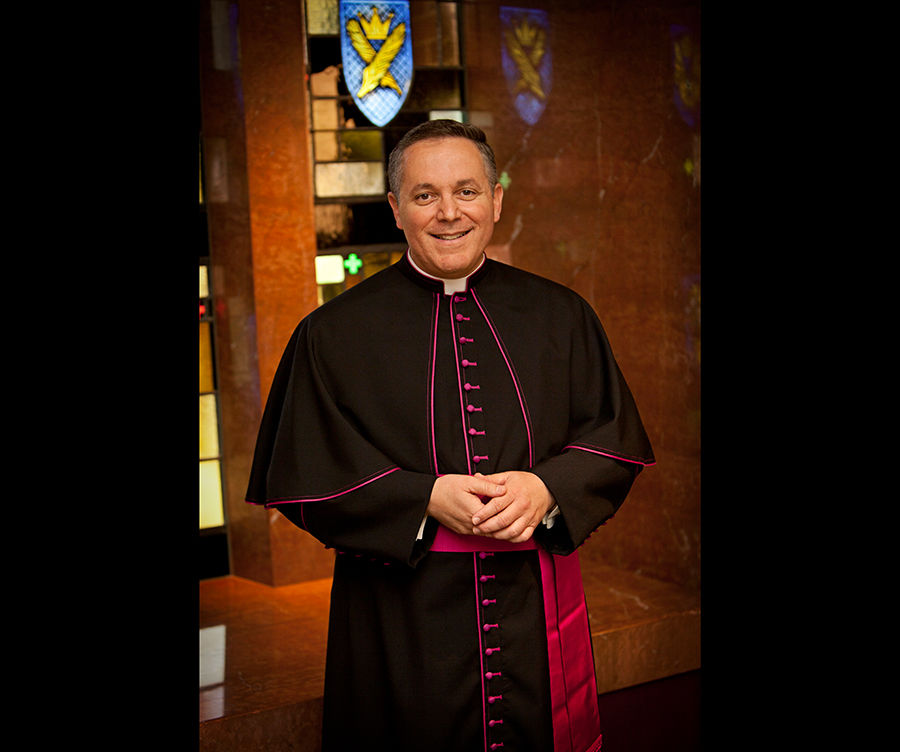Msgr. Sabato “Sal” Pilato celebrated the 25th anniversary of his ordination this year. He is also stepping down from the job that he has held for the past nine years, superintendent of Catholic high schools for the Archdiocese of Los Angeles.
As he prepares for a yearlong sabbatical, Msgr. Pilato mused over the 21 years he has spent in Catholic high school education. “I thought I could do some administration for a little while; I never thought it would be 21 years,” he said.
Wanting to spend some time in administration, he applied to be an assistant principal after completing his first priestly assignment. God had a surprise for him. At the last moment he was asked to be the principal at Junípero Serra High School in Gardena.
Msgr. Pilato was the seventh principal in a dozen years at Serra and the school was facing financial problems, budgetary and personnel issues, and problems with student discipline. It was also suffering, he believed, because it had a weak Catholic identity.
“I was determined to turn the place around, to clean it up and to strengthen discipline, academics, Catholic identity, even athletics,” Msgr. Pilato said. He worked hard and “put together a good team, but it took a lot of persistence and perseverance and a lot of late nights,” he continued. He knew that faith formation and Catholic identity were going to be key issues to turn the school around.
“The ongoing theme for me was that I needed to run this place like a parish, it needed to have a strong faith life. That was always in the forefront of my mind,” he said. Msgr. Pilato is credited by many for changing the culture at the school.
In his last years at Serra, he considered leaving education to become a pastor. God had another surprise for him. Cardinal Roger M. Mahony called upon Msgr. Pilato to fill the superintendent position at the archdiocese.
“[Cardinal Mahony] asked me to focus on two things in particular: strengthen the Catholic identity of all the high schools the way that I did it at Serra and look at new ways of increasing enrollment and marketing,” he said.
The superintendent’s job touches many areas — curriculum, discipline issues, personnel issues, legal issues — but those two areas were a big focus of his work. Being superintendent was a different level of challenge — it meant dealing with 51 high schools (five parish-based, 21 archdiocesan and 25 private).
“Catholic identity was a topic that was more discussed during these years than in the past; we challenged ourselves more on it,” he said. “We put instruments in place, annual reports and standards, visitation of schools to focus on it.” Goals and standards were set and implemented for all 51 high schools, which affected faith formation for both students and faculty, with tangible results.
“I feel we’re in a different place, I think we’re in a better place. I left Serra better than the way I found it and I think I’m leaving the archdiocesan high schools better than [I found them],” said Msgr. Pilato. “Every school in every system wants to build and be better than it is, and I think I was able to take it to the next level, and the people after me should be able to do the same thing, take it to the next level.”
Big challenges remain, including affordability and efforts to grow enrollment. “We can’t let up on fundraising and development. We’ve made great strides in the last six years in development. In order to continue to grow enrollment we need to have financial aid,” he said.
In the area of enrollment, a massive marketing program was begun and a new program called Max LA provides real-time data, grants and workshops on development, marketing and fundraising. One result was a major increase in funds raised for financial aid.
Another result was understanding that the system was too dependent on the Catholic elementary schools for incoming enrollment. “Our marketing program forced our schools to look at enrollment and recruitment in a different way,” said Msgr. Pilato. A larger percentage of students now come into the Catholic high schools from the public and charter schools than ever before.
New focus is placed on retention of students, which is an area of challenge based on school data showing that retention issues have caused some enrollment decline. “That will be hopefully the focus of the next administration,” he said.
After 21 years in Catholic education, it’s the small pastoral things that bring him joy. “The biggest treat for me is when a former student calls and says, ‘Father would you do my wedding.’ That’s a big treat. I have a baptism coming up for a child of a former teacher. Those have been very beautiful experiences for me,” he said.
“The downside of being a priest-principal is you’re involved in a lot of discipline, hiring, firing, suspending kids, expelling kids, so to be there in a pastoral way, in a priestly way, it’s exciting. I really enjoy that,” he added.
Now it’s time for sabbatical and wondering about the next item on a résumé brimming with ministerial positions, jobs, board appointments and numerous honors.
“I don’t know. I could reflect and think, ‘OK, it’s time to be a pastor,’ maybe be a high school principal for a little while again [or] there could be something else that God surprises me with,” said Msgr. Sal. “I just want to be ready by spending a little more time in prayer, reflection and discernment and … just trying to decompress after being in a pressure cooker for nine years.”
